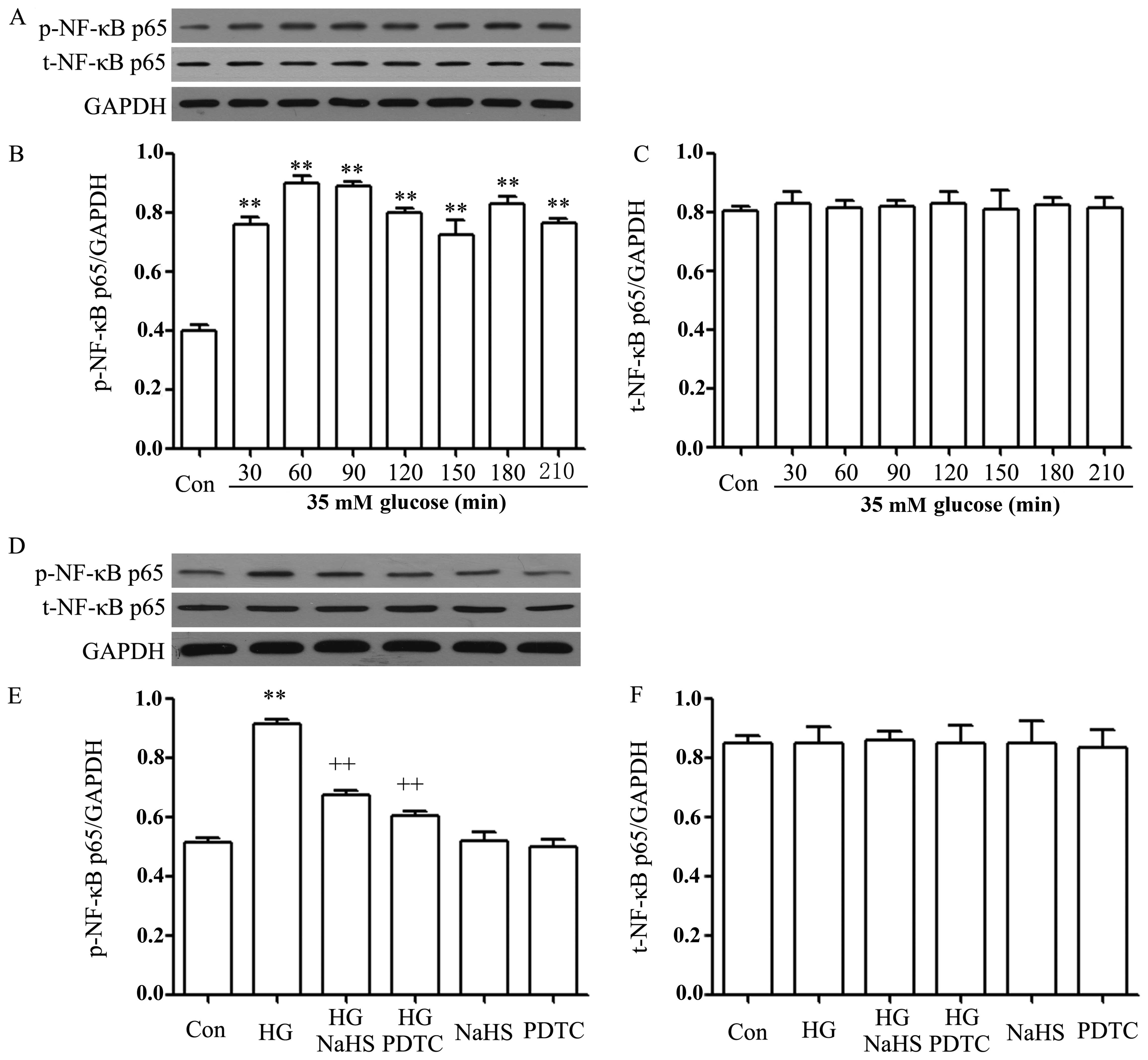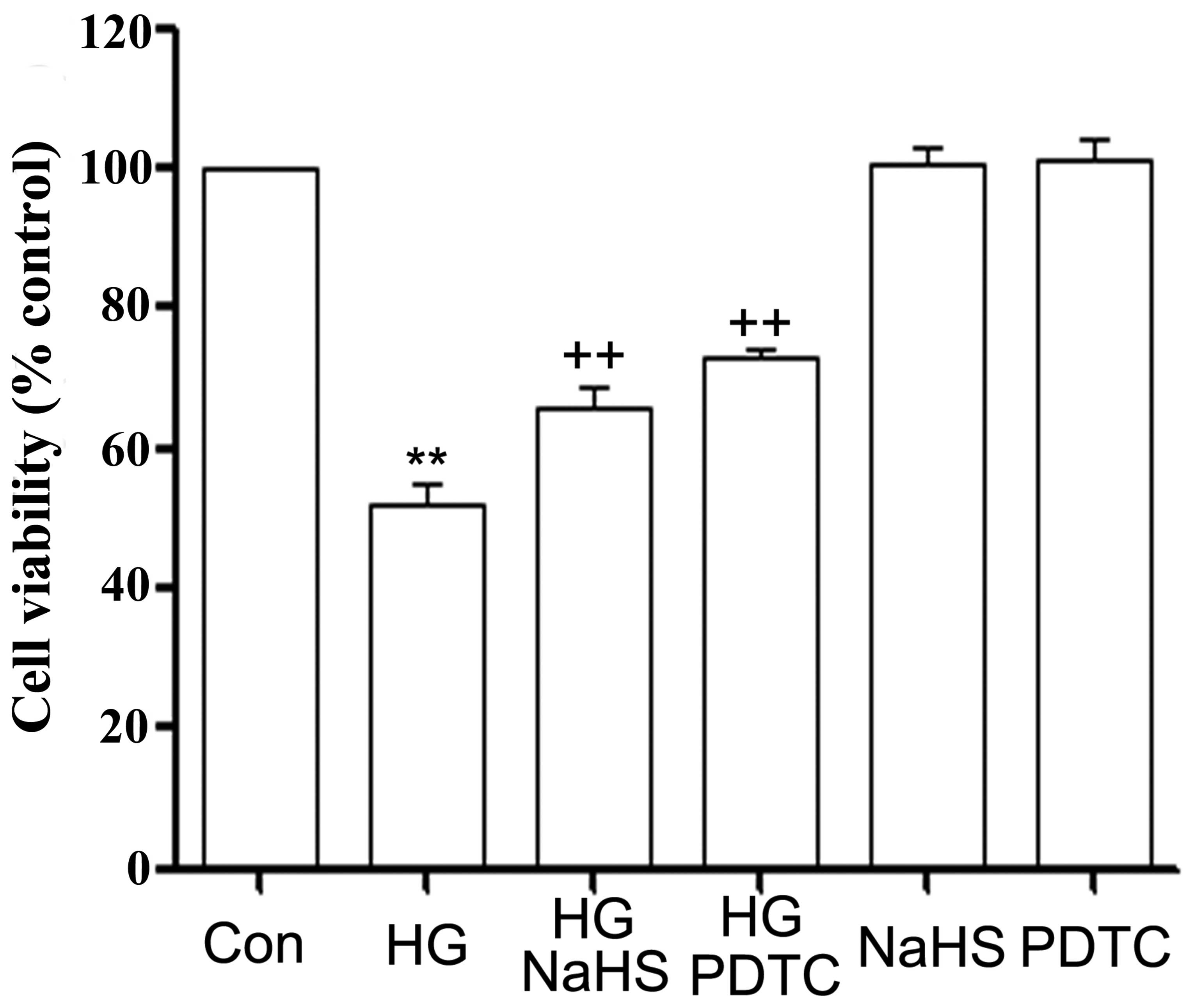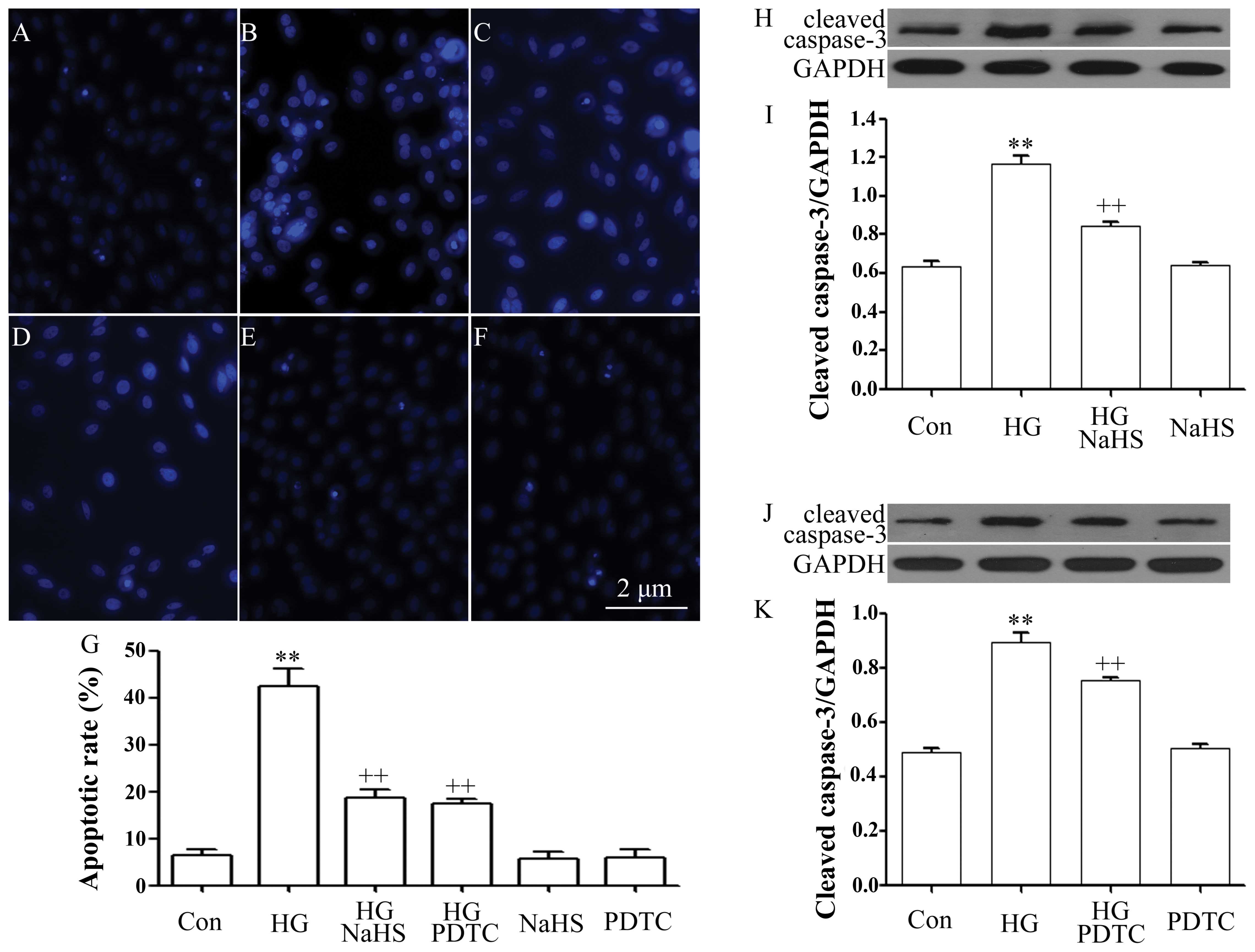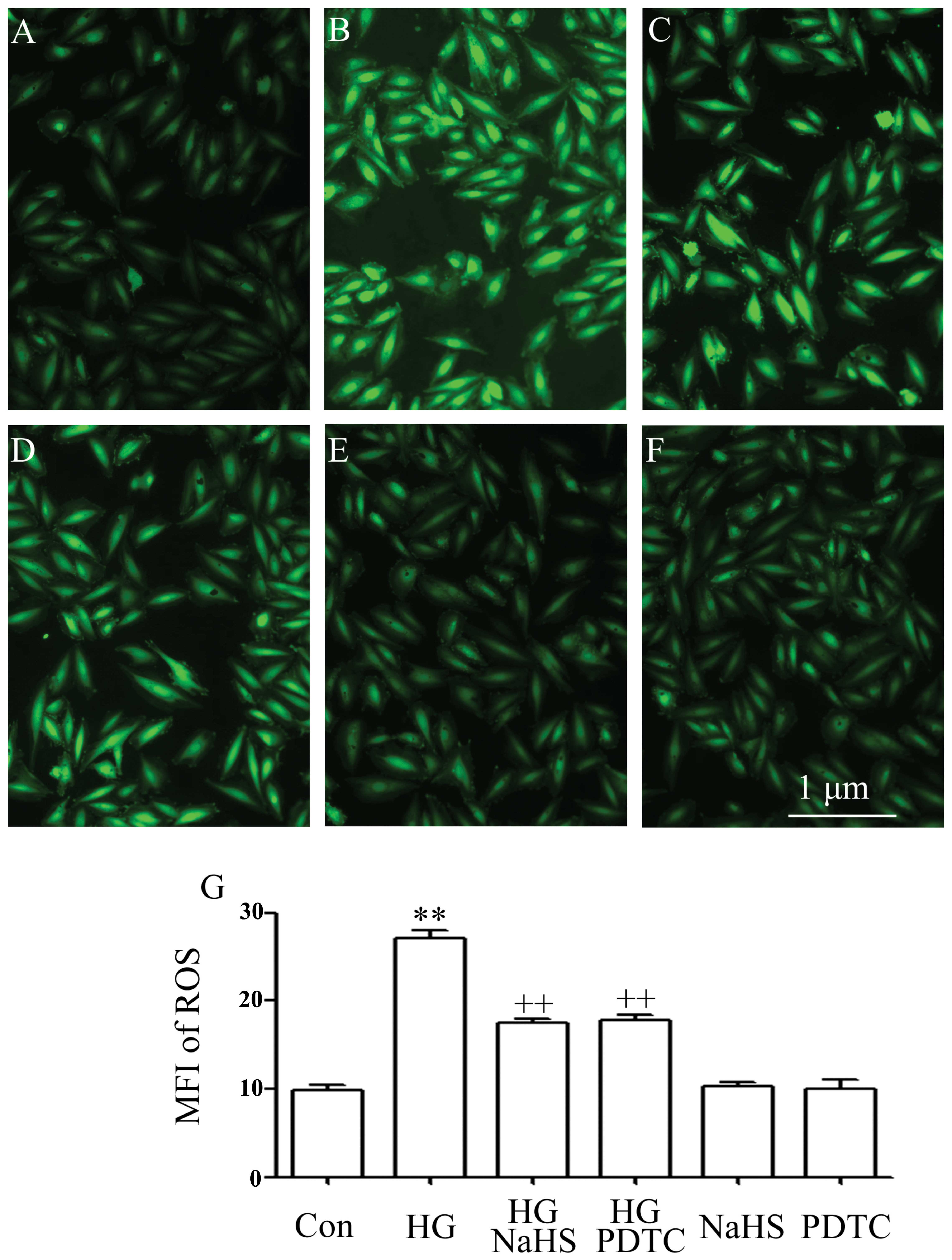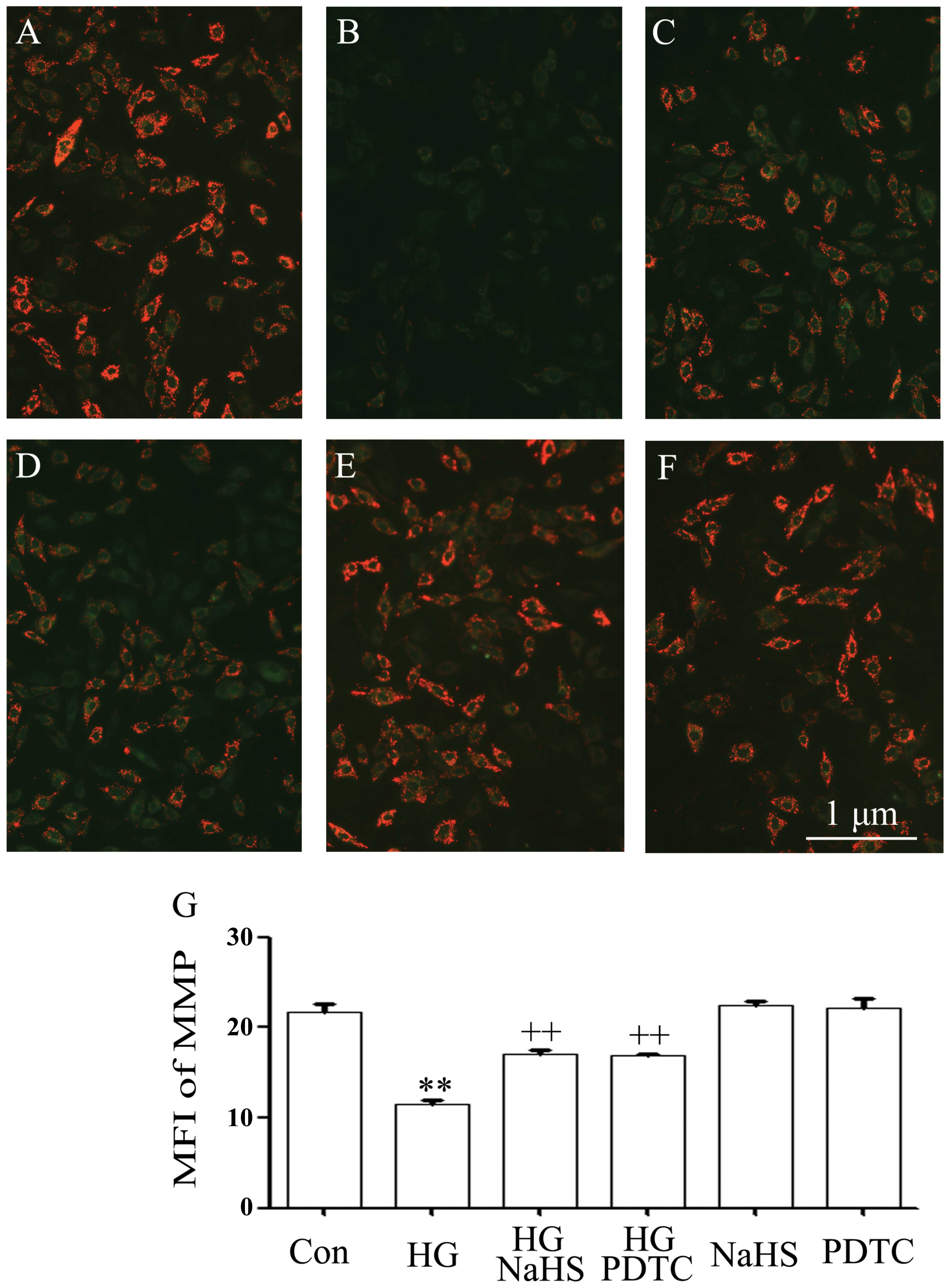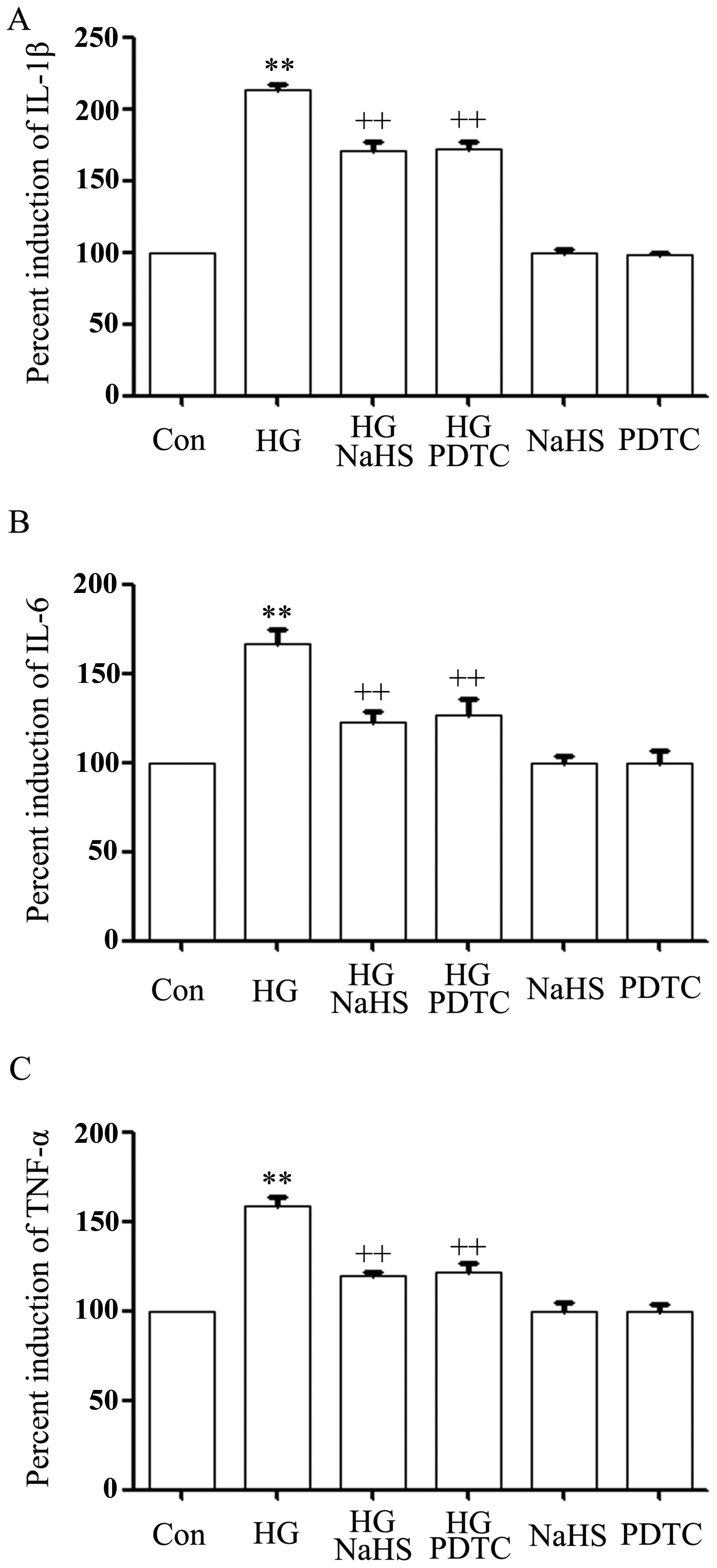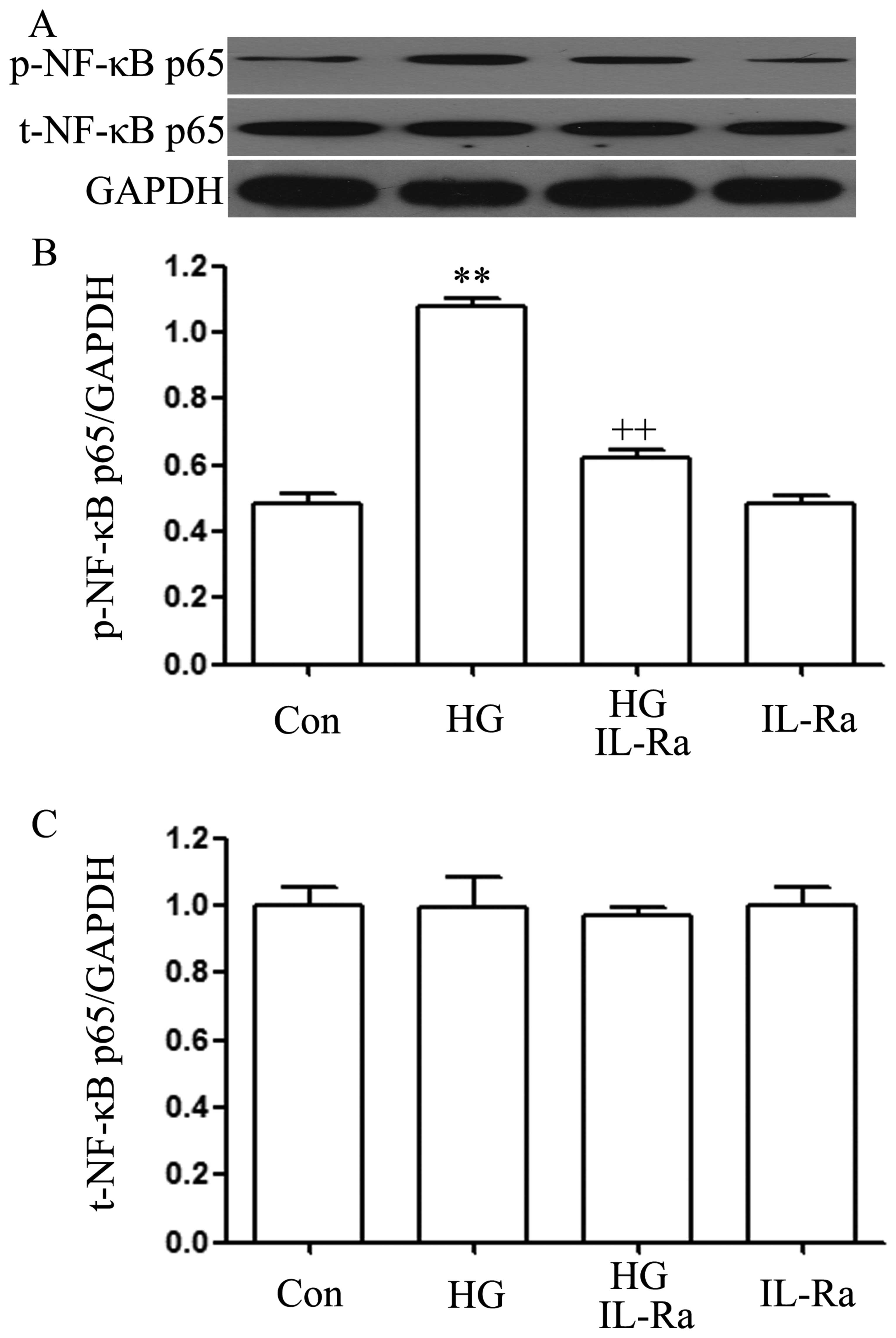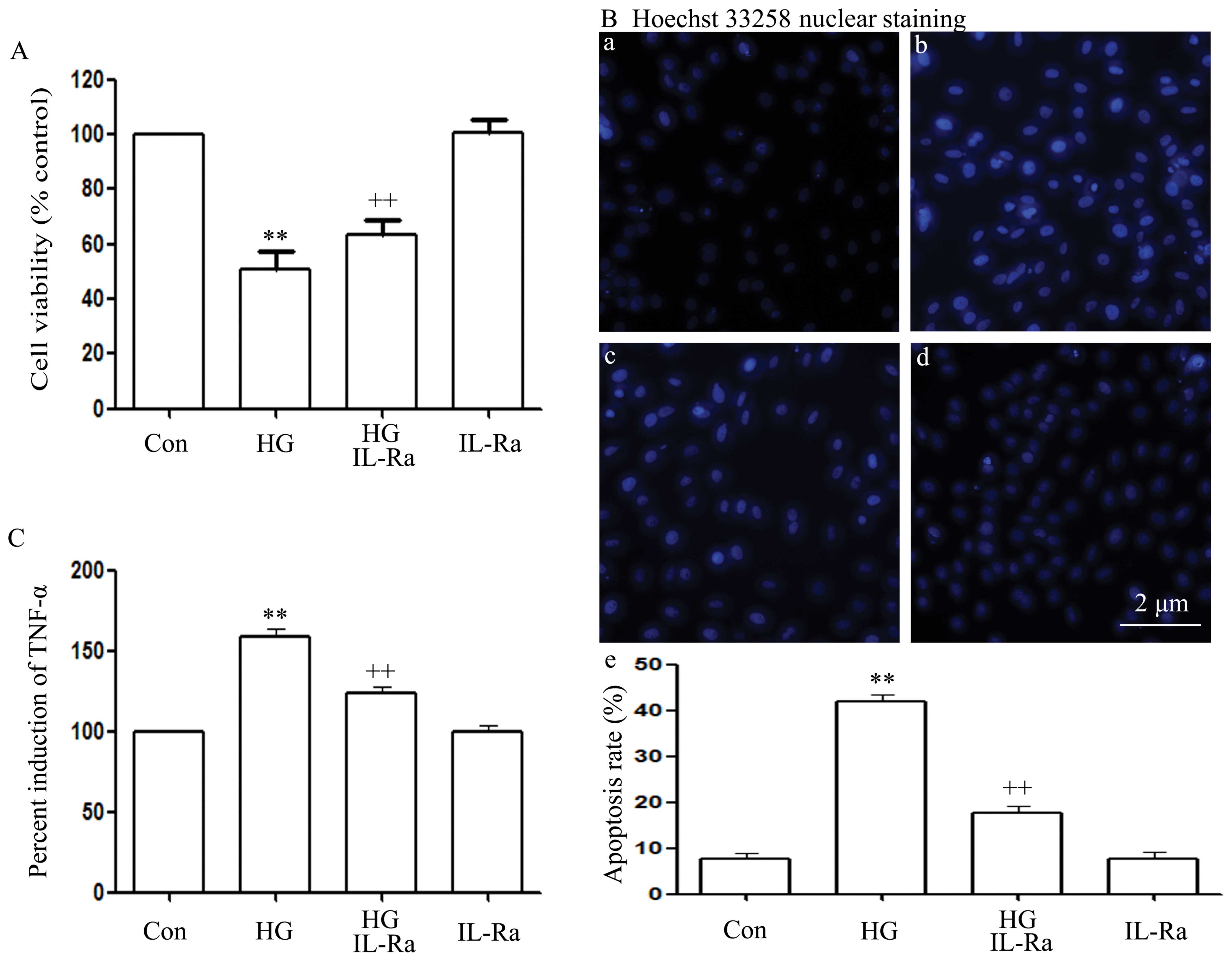|
1
|
Brownlee M: Biochemistry and molecular
cell biology of diabetic complications. Nature. 414:813–820. 2001.
View Article : Google Scholar : PubMed/NCBI
|
|
2
|
Ren J and Davidoff AJ: Diabetes rapidly
induces contractile dysfunctions in isolated ventricular myocytes.
Am J Physiol. 272:H148–H158. 1997.PubMed/NCBI
|
|
3
|
Soetikno V, Sari FR, Sukumaran V, et al:
Curcumin prevents diabetic cardiomyopathy in streptozotocin-induced
diabetic rats: possible involvement of PKC-MAPK signaling pathway.
Eur J Pharm Sci. 47:604–614. 2012. View Article : Google Scholar : PubMed/NCBI
|
|
4
|
Peake BF, Nicholson CK, Lambert JP, et al:
Hydrogen sulfide preconditions the db/db diabetic mouse heart
against ischemia-reperfusion injury by activating Nrf2 signaling in
an Erk-dependent manner. Am J Physiol Heart Circ Physiol.
304:H1215–H1224. 2013. View Article : Google Scholar : PubMed/NCBI
|
|
5
|
Xu W, Wu W, Chen J, et al: Exogenous
hydrogen sulfide protects H9c2 cardiac cells against high
glucose-induced injury by inhibiting the activities of the p38 MAPK
and ERK1/2 pathways. Int J Mol Med. 32:917–925. 2013.PubMed/NCBI
|
|
6
|
Chen J, Mo H, Guo R, et al: Inhibition of
the leptin-induced activation of the p38 MAPK pathway contributes
to the protective effects of naringin against high glucose-induced
injury in H9c2 cardiac cells. Int J Mol Med. 33:605–612.
2014.PubMed/NCBI
|
|
7
|
Huang H, Wu K, You Q, et al: Naringin
inhibits high glucose-induced cardiomyocyte apoptosis by
attenuating mitochondrial dysfunction and modulating the activation
of the p38 signaling pathway. Int J Mol Med. 32:396–402.
2013.PubMed/NCBI
|
|
8
|
Cai L, Li W, Wang G, et al:
Hyperglycemia-induced apoptosis in mouse myocardium: mitochondrial
cytochrome C-mediated caspase-3 activation pathway. Diabetes.
51:1938–1948. 2002. View Article : Google Scholar : PubMed/NCBI
|
|
9
|
Fiordaliso F, Leri A, Cesselli D, et al:
Hyperglycemia activates p53 and p53-regulated genes leading to
myocyte cell death. Diabetes. 50:2363–2375. 2001. View Article : Google Scholar : PubMed/NCBI
|
|
10
|
Chen J, Guo R, Yan H, et al: Naringin
inhibits ROS-activated MAPK pathway in high glucose-induced
injuries in H9c2 cardiac cells. Basic Clin Pharmacol Toxicol.
114:293–304. 2014. View Article : Google Scholar
|
|
11
|
Yan J, Young ME, Cui L, et al: Increased
glucose uptake and oxidation in mouse hearts prevent high fatty
acid oxidation but cause cardiac dysfunction in diet-induced
obesity. Circulation. 119:2818–2828. 2009. View Article : Google Scholar : PubMed/NCBI
|
|
12
|
Majumdar P, Chen S, George B, et al:
Leptin and endothelin-1 mediated increased extracellular matrix
protein production and cardiomyocyte hypertrophy in diabetic heart
disease. Diabetes Metab Res Rev. 25:452–463. 2009. View Article : Google Scholar : PubMed/NCBI
|
|
13
|
Baldwin AS Jr: The NF-kappa B and I kappa
B proteins: new discoveries and insights. Annu Rev Immunol.
14:649–683. 1996. View Article : Google Scholar : PubMed/NCBI
|
|
14
|
Guo RM, Xu WM, Lin JC, et al: Activation
of the p38 MAPK/NF-κB pathway contributes to doxorubicin-induced
inflammation and cytotoxicity in H9c2 cardiac cells. Mol Med Rep.
8:603–608. 2013.PubMed/NCBI
|
|
15
|
Guo R, Wu K, Chen J, et al: Exogenous
hydrogen sulfide protects against doxorubicin-induced inflammation
and cytotoxicity by inhibiting p38MAPK/NFκB pathway in H9c2 cardiac
cells. Cell Physiol Biochem. 32:1668–1680. 2013.
|
|
16
|
Hirotani S, Otsu K, Nishida K, et al:
Involvement of nuclear factor-kappaB and apoptosis
signal-regulating kinase 1 in G-protein-coupled receptor
agonist-induced cardiomyocyte hypertrophy. Circulation.
105:509–515. 2002. View Article : Google Scholar : PubMed/NCBI
|
|
17
|
Thandavarayan RA, Giridharan VV, Sari FR,
et al: Depletion of 14-3-3 protein exacerbates cardiac oxidative
stress, inflammation and remodeling process via modulation of
MAPK/NF-κB signaling pathways after streptozotocin-induced diabetes
mellitus. Cell Physiol Biochem. 28:911–922. 2011. View Article : Google Scholar
|
|
18
|
Zhuang XD, Hu X, Long M, et al: Exogenous
hydrogen sulfide alleviates high glucose-induced cardiotoxicity via
inhibition of leptin signaling in H9c2 cells. Mol Cell Biochem.
391:147–155. 2014. View Article : Google Scholar : PubMed/NCBI
|
|
19
|
Łowicka E and Bełtowski J: Hydrogen
sulfide (H2S) - the third gas of interest for
pharmacologists. Pharmacol Rep. 59:4–24. 2007.
|
|
20
|
Moore PK, Bhatia M and Moochhala S:
Hydrogen sulfide: from the smell of the past to the mediator of the
future? Trends Pharmacol Sci. 24:609–611. 2003. View Article : Google Scholar : PubMed/NCBI
|
|
21
|
Geng B, Chang L, Pan C, et al: Endogenous
hydrogen sulfide regulation of myocardial injury induced by
isoproterenol. Biochem Biophys Res Commun. 318:756–763. 2004.
View Article : Google Scholar : PubMed/NCBI
|
|
22
|
Calvert JW, Jha S, Gundewar S, Elrod JW,
et al: Hydrogen sulfide mediates cardioprotection through Nrf2
signaling. Circ Res. 105:365–374. 2009. View Article : Google Scholar : PubMed/NCBI
|
|
23
|
Chen SL, Yang CT, Yang ZL, et al: Hydrogen
sulphide protects H9c2 cells against chemical hypoxia-induced
injury. Clin Exp Pharmacol Physiol. 37:316–321. 2010. View Article : Google Scholar
|
|
24
|
Yang Z, Yang C, Xiao L, et al: Novel
insights into the role of HSP90 in cytoprotection of H2S
against chemical hypoxia-induced injury in H9c2 cardiac myocytes.
Int J Mol Med. 28:397–403. 2011.PubMed/NCBI
|
|
25
|
Suzuki K, Olah G, Modis K, et al: Hydrogen
sulfide replacement therapy protects the vascular endothelium in
hyperglycemia by preserving mitochondrial function. Proc Natl Acad
Sci USA. 108:13829–13834. 2011. View Article : Google Scholar : PubMed/NCBI
|
|
26
|
Jain SK, Bull R, Rains JL, et al: Low
levels of hydrogen sulfide in the blood of diabetes patients and
streptozotocin-treated rats causes vascular inflammation? Antioxid
Redox Signal. 12:1333–1337. 2010. View Article : Google Scholar : PubMed/NCBI
|
|
27
|
Ahmad FU, Sattar MA, Rathore HA, et al:
Exogenous hydrogen sulfide (H2S) reduces blood pressure
and prevents the progression of diabetic nephropathy in
spontaneously hypertensive rats. Ren Fail. 34:203–210. 2012.
|
|
28
|
Whiteman M, Gooding KM, Whatmore JL, et
al: Adiposity is a major determinant of plasma levels of the novel
vasodilator hydrogen sulphide. Diabetologia. 53:1722–1726. 2010.
View Article : Google Scholar : PubMed/NCBI
|
|
29
|
Gao Y, Yao X, Zhang Y, et al: The
protective role of hydrogen sulfide in myocardial
ischemia-reperfusion-induced injury in diabetic rats. Int J
Cardiol. 152:177–183. 2011. View Article : Google Scholar : PubMed/NCBI
|
|
30
|
Yang C, Yang Z, Zhang M, et al: Hydrogen
sulfide protects against chemical hypoxia-induced cytotoxicity and
inflammation in HaCaT cells through inhibition of ROS/NF-κB/COX-2
pathway. PLoS One. 6:e219712011. View Article : Google Scholar
|
|
31
|
Ehses JA, Lacraz G, Giroix MH, et al: IL-1
antagonism reduces hyperglycemia and tissue inflammation in the
type 2 diabetic GK rat. Proc Natl Acad Sci USA. 106:13998–14003.
2009. View Article : Google Scholar : PubMed/NCBI
|
|
32
|
Barnes PJ and Karin M: Nuclear
factor-kappaB: a pivotal transcription factor in chronic
inflammatory diseases. N Engl J Med. 336:1066–1071. 1997.
View Article : Google Scholar : PubMed/NCBI
|
|
33
|
Hu LF, Wong PT, Moore PK and Bian JS:
Hydrogen sulfide attenuates lipopolysaccharide-induced inflammation
by inhibition of p38 mitogen-activated protein kinase in microglia.
J Neurochem. 100:1121–1128. 2007. View Article : Google Scholar : PubMed/NCBI
|
|
34
|
Satoh M, Ogita H, Takeshita K, et al:
Requirement of Rac1 in the development of cardiac hypertrophy. Proc
Natl Acad Sci USA. 103:7432–7437. 2006. View Article : Google Scholar : PubMed/NCBI
|
|
35
|
Liu SF, Ye X and Malik AB: Inhibition of
NF-kappaB activation by pyrrolidine dithiocarbamate prevents in
vivo expression of proinflammatory genes. Circulation.
100:1330–1337. 1999. View Article : Google Scholar : PubMed/NCBI
|
|
36
|
Kowluru RA and Kanwar M: Effects of
curcumin on retinal oxidative stress and inflammation in diabetes.
Nutr Metab (Lond). 4:82007. View Article : Google Scholar
|
|
37
|
Cichon MA and Radisky DC: ROS-induced
epithelial-mesenchymal transition in mammary epithelial cells is
mediated by NF-κB-dependent activation of Snail. Oncotarget.
5:2827–2838. 2014.PubMed/NCBI
|
|
38
|
Goldin A, Beckman JA, Schmidt AM and
Creager MA: Advanced glycation end products: sparking the
development of diabetic vascular injury. Circulation. 114:597–605.
2006. View Article : Google Scholar : PubMed/NCBI
|
|
39
|
Varo N, Vicent D, Libby P, et al: Elevated
plasma levels of the atherogenic mediator soluble CD40 ligand in
diabetic patients: a novel target of thiazolidinediones.
Circulation. 107:2664–2669. 2003. View Article : Google Scholar : PubMed/NCBI
|
|
40
|
Aronson D, Bartha P, Zinder O, et al:
Association between fasting glucose and C-reactive protein in
middle-aged subjects. Diabet Med. 21:39–44. 2004. View Article : Google Scholar : PubMed/NCBI
|
|
41
|
Kuo WW, Wang WJ, Tsai CY, et al: Diallyl
trisufide (DATS) suppresses high glucose-induced cardiomyocyte
apoptosis by inhibiting JNK/NFκB signaling via attenuating ROS
generation. Int J Cardiol. 168:270–280. 2013. View Article : Google Scholar
|
|
42
|
Chang CK and LoCicero J 3rd: Overexpressed
nuclear factor kappaB correlates with enhanced expression of
interleukin-1beta and inducible nitric oxide synthase in aged
murine lungs to endotoxic stress. Ann Thorac Surg. 77:1222–1227.
2004. View Article : Google Scholar : PubMed/NCBI
|
|
43
|
Bujak M and Frangogiannis NG: The role of
IL-1 in the pathogenesis of heart disease. Arch Immunol Ther Exp
(Warsz). 57:165–176. 2009. View Article : Google Scholar
|
|
44
|
Dinarello CA, Cannon JG, Mancilla J, et
al: Interleukin-6 as an endogenous pyrogen: induction of
prostaglandin E2 in brain but not in peripheral blood mononuclear
cells. Brain Res. 562:199–206. 1991. View Article : Google Scholar : PubMed/NCBI
|
|
45
|
El-Seweidy MM, Sadik NA and Shaker OG:
Role of sulfurous mineral water and sodium hydrosulfide as potent
inhibitors of fibrosis in the heart of diabetic rats. Arch Biochem
Biophys. 506:48–57. 2011. View Article : Google Scholar
|















